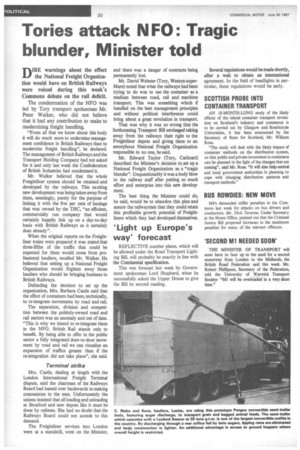Tories attack NFO: Tragic blunder, Minister told
Page 32

If you've noticed an error in this article please click here to report it so we can fix it.
DIRE warnings about the effect the National Freight Organization would have on British Railways were voiced during this week's Commons debate on the rail deficit.
The condemnation of the NFO was led by Tory transport spokesman Mr. Peter Walker, who did not believe that it had any contribution to make to modernizing freight handling.
"From all that we know about this body it will do much more to undermine management confidence in British Railways than to modernize freight handling", he declared. The management of British Railways and the Transport Holding Company had not asked for it and only last week the Confederation of British Industries had condemned it.
Mr. Walker believed that the whole Freightliner system should be retained and developed by the railways. This exciting new development was being taken away from them, seemingly, purely for the purpose of linking it with the five per cent of haulage that was owned by the THC, "an efficient, commercially run company that would certainly happily link up on a day-to-day basis with British Railways as it certainly does already".
When the original reports on the Freightliner trains were prepared it was stated that three-fifths of the traffic that could be expected for them would come from professional hauliers, recalled Mr. Walker. He believed that setting up a National Freight Organization would frighten away those hauliers who should be bringing business to British Railways.
Defending the decision to set up the organization, Mrs. Barbara Castle said that the effect of containers had been, technically, to re-integrate movements by road and rail.
The separation, division and competition between the publicly-owned road and rail sectors was an anomaly and out of date. "This is why we intend to re-integrate them in the NFO. British Rail stands only to benefit. By being able to offer in the public sector a fully integrated door-to-door movement by road and rail we can visualize an expansion of traffics greater than if the re-integration did not take place", she said.
Terminal strike Mrs. Castle, dealing at length with the London International Freight Terminal dispute, said the chairman of the Railways Board had leaned over backwards in making concessions to the men. Unfortunately the unions insisted that all loading and unloading at Stratford and new depots like it must be done by railmen. She had no doubt that the Railways Board could not accede to this demand.
The Freightliner services into London were at a standstill, went on the Minister, and there was a danger of contracts being permanently lost.
Mr. David Webster (Tory, Weston-superMare) noted that what the railways had been trying to do was to use the container as a medium between road, rail and maritime transport. This was something which if handled on the best management principles and without political interference could bring about a great revolution in transport That was why it was so wrong that the forthcoming Transport Bill envisaged taking away from the railways their right to the Freightliner depots and giving them to an amorphous National Freight Organization responsible to no one, he said.
Mr. Edward Taylor (Tory, Cathcart) described the Minister's decision to set up a National Freight Organization as a "tragic blunder". Unquestionably it was a body blow to the railway staff after putting so much effort and enterprise into this new development.
The best thing the Minister could do, he said, would be to abandon this plan and assure the railwaymen that they could retain this profitable growth potential of Freightliners which they had developed themselves.
'Light up Europe's way' forecast
REFLECTIVE number plates, which will be allowed under the Road Transport Lighting Bill, will probably be exactly in line with the Continental specification.
This was forecast last week by Government spokesman Lord Shepherd, when he successfully asked the Upper House to give the Bill its second reading.
Several regulations would be made shortly, after a wait to obtain an international agreement. In the field of headlights in particular, these regulations would be early.
SCOTTISH PROBE INTO CONTAINER TRANSPORT
AN 18-MONTH-LONG study of the likely effects of the inland container transport revolution on Scotland's industry and commerce is to be carried out by Glasgow and, Strathclyde Universities, it has been announced by the Secretary of State for Scotland, Mr. William Ross.
"The study will deal with the likely impact of container methods on the distribution system, so that public and private investment in containers can be planned in the light of the changes that are coming", said Mr. Ross. "It will also help central and local government authorities in planning to cope with changing distribution patterns and transport methods."
BUS ROWDIES: NEW MOVE MPs demanded stiffer penalties in the Commons last week for attacks on bus drivers and conductors. Mr. Dick Taverne, Under Secretary at the Home Office, pointed out that the Criminal Justice Bill proposed increases in the maximum penalties for many of the relevant offences.
'SECOND M1 NEEDED SOON' THE MINISTER OF TRANSPORT will soon have to face up to the need for a second motorway from London to the Midlands, the British Road Federation said this week. Mr. Robert Phillipson, Secretary of the Federation, told the University of Warwick Transport Society: "Ml will be overloaded in a very short time."
























































































































